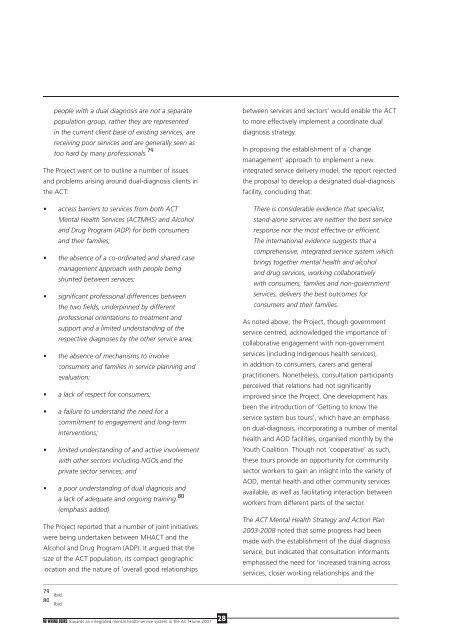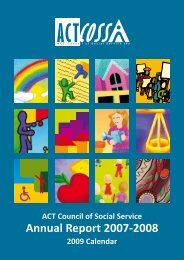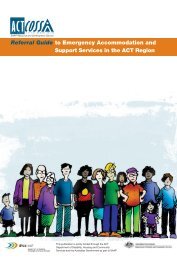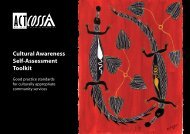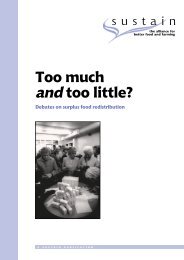actcoss text final.indd - ACT Council of Social Service
actcoss text final.indd - ACT Council of Social Service
actcoss text final.indd - ACT Council of Social Service
You also want an ePaper? Increase the reach of your titles
YUMPU automatically turns print PDFs into web optimized ePapers that Google loves.
people with a dual diagnosis are not a separate<br />
population group, rather they are represented<br />
in the current client base <strong>of</strong> existing services, are<br />
receiving poor services and are generally seen as<br />
too hard by many pr<strong>of</strong>essionals. 79<br />
The Project went on to outline a number <strong>of</strong> issues<br />
and problems arising around dual-diagnosis clients in<br />
the <strong>ACT</strong>:<br />
between services and sectors’ would enable the <strong>ACT</strong><br />
to more effectively implement a coordinate dual<br />
diagnosis strategy.<br />
In proposing the establishment <strong>of</strong> a ‘change<br />
management’ approach to implement a new<br />
integrated service delivery model, the report rejected<br />
the proposal to develop a designated dual-diagnosis<br />
facility, concluding that:<br />
• access barriers to services from both <strong>ACT</strong><br />
Mental Health <strong>Service</strong>s (<strong>ACT</strong>MHS) and Alcohol<br />
and Drug Program (ADP) for both consumers<br />
and their families;<br />
• the absence <strong>of</strong> a co-ordinated and shared case<br />
management approach with people being<br />
shunted between services;<br />
• significant pr<strong>of</strong>essional differences between<br />
the two fields, underpinned by different<br />
pr<strong>of</strong>essional orientations to treatment and<br />
support and a limited understanding <strong>of</strong> the<br />
respective diagnoses by the other service area;<br />
• the absence <strong>of</strong> mechanisms to involve<br />
consumers and families in service planning and<br />
evaluation;<br />
• a lack <strong>of</strong> respect for consumers;<br />
• a failure to understand the need for a<br />
commitment to engagement and long-term<br />
interventions;<br />
• limited understanding <strong>of</strong> and active involvement<br />
with other sectors including NGOs and the<br />
private sector services; and<br />
• a poor understanding <strong>of</strong> dual diagnosis and<br />
a lack <strong>of</strong> adequate and ongoing training. 80<br />
(emphasis added)<br />
The Project reported that a number <strong>of</strong> joint initiatives<br />
were being undertaken between MH<strong>ACT</strong> and the<br />
Alcohol and Drug Program (ADP). It argued that the<br />
size <strong>of</strong> the <strong>ACT</strong> population, its compact geographic<br />
location and the nature <strong>of</strong> ‘overall good relationships<br />
There is considerable evidence that specialist,<br />
stand-alone services are neither the best service<br />
response nor the most effective or efficient.<br />
The international evidence suggests that a<br />
comprehensive, integrated service system which<br />
brings together mental health and alcohol<br />
and drug services, working collaboratively<br />
with consumers, families and non-government<br />
services, delivers the best outcomes for<br />
consumers and their families.<br />
As noted above, the Project, though government<br />
service centred, acknowledged the importance <strong>of</strong><br />
collaborative engagement with non-government<br />
services (including Indigenous health services),<br />
in addition to consumers, carers and general<br />
practitioners. Nonetheless, consultation participants<br />
perceived that relations had not significantly<br />
improved since the Project. One development has<br />
been the introduction <strong>of</strong> ‘Getting to know the<br />
service system bus tours’, which have an emphasis<br />
on dual-diagnosis, incorporating a number <strong>of</strong> mental<br />
health and AOD facilities, organised monthly by the<br />
Youth Coalition. Though not ‘cooperative’ as such,<br />
these tours provide an opportunity for community<br />
sector workers to gain an insight into the variety <strong>of</strong><br />
AOD, mental health and other community services<br />
available, as well as facilitating interaction between<br />
workers from different parts <strong>of</strong> the sector.<br />
The <strong>ACT</strong> Mental Health Strategy and Action Plan<br />
2003-2008 noted that some progress had been<br />
made with the establishment <strong>of</strong> the dual diagnosis<br />
service, but indicated that consultation informants<br />
emphasised the need for ‘increased training across<br />
services, closer working relationships and the<br />
___________________________________________________________________________________________________________________________<br />
79 Ibid.<br />
80 Ibid.<br />
NO WRONG DOORS Towards an integrated mental health service system in the <strong>ACT</strong>•June 2007<br />
28


